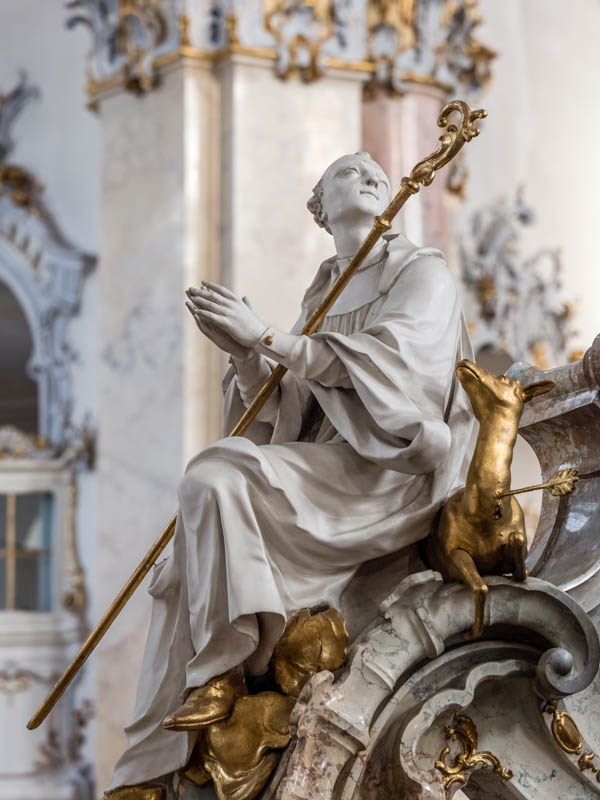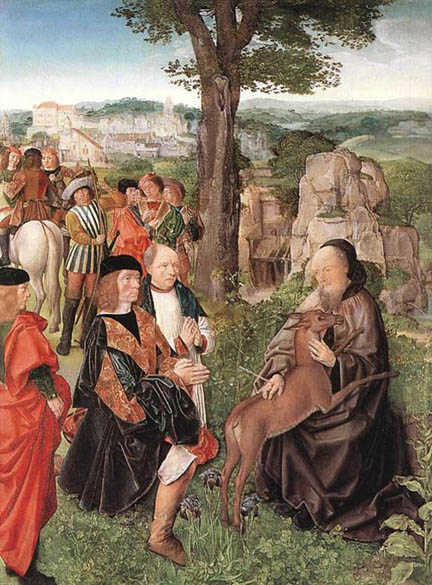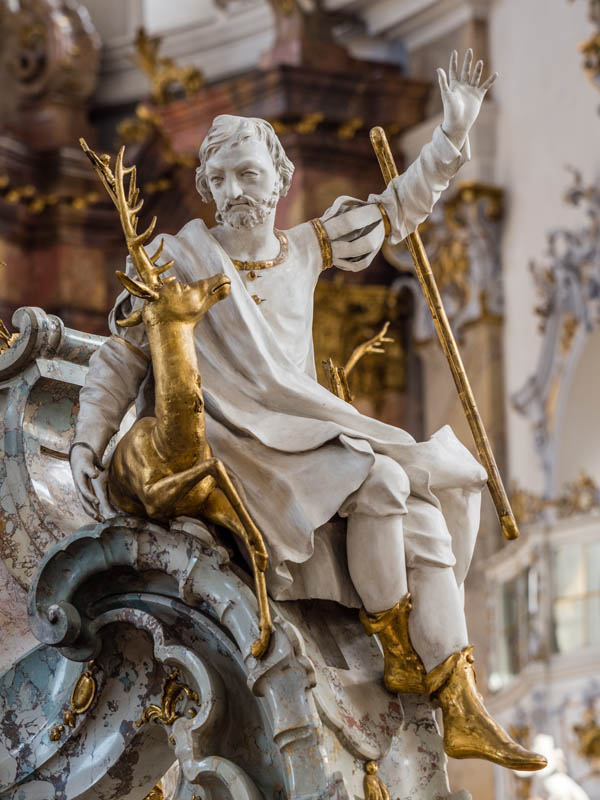Catholic Doctrine and Devotion
Devotion to the Fourteen Holy Helpers
Adapted from the book compiled by Fr. Bonaventure Hammer OFM.
(The following are the Legends of those Fourteen Holy Helpers whose feast days occur during the month of
September:)
St. Aegidius, Hermit and Abbot (Feast – September 1)
As one of the Holy Helpers, Saint Aegidius (or Giles) is invoked against panic, epilepsy,
madness and nocturnal terrors.
He is the patron of cripples and beggars.
 Athens, in Greece, was the native city of St. Aegidius. He was of noble parentage, and devoted himself from
early youth to piety and learning. After the death of his parents, he distributed his rich inheritance to the poor,
and to escape the applause of men for his charity left his country to bury himself in obscurity.
Athens, in Greece, was the native city of St. Aegidius. He was of noble parentage, and devoted himself from
early youth to piety and learning. After the death of his parents, he distributed his rich inheritance to the poor,
and to escape the applause of men for his charity left his country to bury himself in obscurity.
He sailed for France, and on his arrival there retired to a deserted country near the mouth of the river Rhone.
Later he made his abode near the river Gard, and finally buried himself in a forest in the diocese of Nimes.
In his solitude he passed many years, living on wild herbs and roots, with water for his drink. It is related that
for some time a hind (or doe) came daily to be milked by him, thus furnishing him additional sustenance.
Here he lived, disengaged from the cares of earth, conversing only with God, and engaged in the contemplation of
heavenly things.
One day the king instituted a great hunt in the forest where Aegidius lived, and encountered the hind.
Giving chase, the royal hunter was led to the Saint's hut, where the panting animal sought refuge. The king enquired
who he was, and was greatly edified at the holiness of his life. The fame of the saintly hermit now spread far and wide,
and was much increased by the many miracles wrought through his intercession. The king tried to persuade him to leave his
solitude, but prevailed upon him only in so far that Aegidius accepted several disciples and founded a monastery in which
the rule of St. Benedict was observed, and of which he was chosen the Abbot. He governed his community wisely and well,
and at the earnest solicitation of his monks was ordained priest.
 The fame of St. Aegidius' sanctity induced the Frankish King, Charles Martel to call him to his court to
relieve him of a great trouble of conscience. The Saint made the journey, and told the king that he would find relief
and comfort only by the sincere confession of a sin which he had hitherto concealed. The king followed his advice,
found interior peace and dismissed Aegidius with many tokens of gratitude. On his homeward journey the Saint raised
the recently deceased son of a nobleman to life.
The fame of St. Aegidius' sanctity induced the Frankish King, Charles Martel to call him to his court to
relieve him of a great trouble of conscience. The Saint made the journey, and told the king that he would find relief
and comfort only by the sincere confession of a sin which he had hitherto concealed. The king followed his advice,
found interior peace and dismissed Aegidius with many tokens of gratitude. On his homeward journey the Saint raised
the recently deceased son of a nobleman to life.
After a short stay in his monastery, St. Aegidius went to Rome, to obtain from the Pope the confirmation of some
privileges and the Apostolic Blessing for his community. The Pope granted his wishes, and presented him, besides,
with two grand and beautifully carved doors of cedar wood for his church.
St. Aegidius died at a ripe old age on September 1, 725. Many miracles were wrought at his tomb.
Lesson
St. Aegidius left his native country and retired into solitude to escape the notice and applause of the world,
and served God as a recluse. To lead such a life, there must be a special call from God. It is not suited to all,
and even inconsistent with the duties of most men. But all are capable of disengaging their affections from the inordinate
attachment to creatures, and of attaining to a pure and holy love of God. By making the love and service of God the motive
of their thoughts and actions, they will sanctify their whole lives.
In whatever conditions of life we may be placed, we have opportunities of subduing our evil inclinations
and mortifying ourselves by frequent self-denials, of watching over our hearts and purifying our senses by recollection
and prayer. Thus each one, in his station of life, may become a saint, by making his calling an exercise of virtue and
his every act a step higher to perfection and eternal glory.
Prayer of the Church
O Lord, we beseech Thee to let us find grace through the intercession of Thy blessed Confessor Aegidius;
that what we can not obtain through our merits may be given us through his intercession. Through Christ Our Lord. Amen.
St. Eustachius, Martyr (Feast – September 20)
As one of the Holy Helpers, Saint Eustachius (or Eustace) is invoked for protection against fire, temporal and eternal.
 At the beginning of the second century, during the reign of Emperor Trajan, there lived in Rome a famous
general by the name of Placidus, who was distinguished among his fellow-citizens for his wealth and military prowess.
It happened one day, that while following the chase he became separated from his companions, and was pursuing with
eagerness a stag of extraordinary size, when suddenly it turned toward him, and he beheld raised aloft between
its antlers the image of Jesus Christ suspended on the Cross. At the same time Our Blessed Savior addressed him in
loving words, inviting him henceforth to follow Him by embracing the Christian Faith, and to make eternal life in
future the object of his pursuit.
At the beginning of the second century, during the reign of Emperor Trajan, there lived in Rome a famous
general by the name of Placidus, who was distinguished among his fellow-citizens for his wealth and military prowess.
It happened one day, that while following the chase he became separated from his companions, and was pursuing with
eagerness a stag of extraordinary size, when suddenly it turned toward him, and he beheld raised aloft between
its antlers the image of Jesus Christ suspended on the Cross. At the same time Our Blessed Savior addressed him in
loving words, inviting him henceforth to follow Him by embracing the Christian Faith, and to make eternal life in
future the object of his pursuit.
Faithful to the grace which he had received, Placidus on his return home communicated the heavenly vision to his wife Tatiana,
who informed him that she too had been favored with a heavenly apparition. Together they went immediately to the Pope,
related their experience, and after due instruction received Baptism.
At the sacred font Placidus received the name of Eustachius, and his wife was called Theopista, while his sons
were baptized by the names of Agapitus and Theopistus.
Upon returning to the spot where he first received the call, Eustachius was favored with another communication
from Our Lord, announcing to him that he was destined to endure many and great afflictions for the sake of Christ.
It was not long before his faith and patience were put to a severe trial. Stripped of all his possessions and forced
to flee from the fury of the persecution, he was reduced to extreme distress, and in the course of his wanderings was
by a series of calamitous events separated from his wife and children, of whom he lost all trace. For many years he
dwelt in a remote spot, following the occupation of a farm laborer, until he was found by the messengers of the Emperor,
who was sadly in need of the skill of his former general, because a fierce war had broken out, in which the Romans
sustained severe losses.
 Being again invested with the command of the imperial troops, Eustachius set out for the seat of war,
and achieved a decisive victory. In the course of his march he had the happiness, by a singular providence of God,
to recover his wife and children, with whom he marched to Rome. His entrance into the city was attended with great rejoicings,
and many were the congratulations which he received on his extraordinary good fortune. But soon afterward a solemn sacrifice
of thanksgiving to the pagan deities was proclaimed, in which he was ordered by the Emperor to take a part. Upon his refusal,
after every effort had been made to shake his constancy, he was condemned to be exposed to the lions in the public
amphitheater along with his wife and children. Finally, as the savage animals. laying aside their natural ferocity,
refused to injure the confessors of Christ, Eustachius and his family were by order of the Emperor enclosed in the body
of an immense brazen bull, which was heated by means of a great fire enkindled beneath. The last moments of these heroic
martyrs were spent in chanting the divine praises, in the midst of which their happy souls passed to the enjoyment of
everlasting bliss. Their bodies, miraculously preserved uninjured, were buried with great devotion by the faithful Christians,
and were afterward transferred to a magnificent church erected in their honor.
Being again invested with the command of the imperial troops, Eustachius set out for the seat of war,
and achieved a decisive victory. In the course of his march he had the happiness, by a singular providence of God,
to recover his wife and children, with whom he marched to Rome. His entrance into the city was attended with great rejoicings,
and many were the congratulations which he received on his extraordinary good fortune. But soon afterward a solemn sacrifice
of thanksgiving to the pagan deities was proclaimed, in which he was ordered by the Emperor to take a part. Upon his refusal,
after every effort had been made to shake his constancy, he was condemned to be exposed to the lions in the public
amphitheater along with his wife and children. Finally, as the savage animals. laying aside their natural ferocity,
refused to injure the confessors of Christ, Eustachius and his family were by order of the Emperor enclosed in the body
of an immense brazen bull, which was heated by means of a great fire enkindled beneath. The last moments of these heroic
martyrs were spent in chanting the divine praises, in the midst of which their happy souls passed to the enjoyment of
everlasting bliss. Their bodies, miraculously preserved uninjured, were buried with great devotion by the faithful Christians,
and were afterward transferred to a magnificent church erected in their honor.
Lesson
How inspiring, to see a great man preferring justice, truth, and religion to the favor of the mighty, readily quitting estate,
friends, country, and even sacrificing life, rather than consent to do violence to his conscience; and to see him, at the same
time, meek, humble, patient in suffering, forgiving sincerely and loving his unjust and treacherous persecutors! Passion and
revenge often beget anger and triumph over virtue and integrity. Ambition and the desire of wealth may, for a time, urge men
on to brave danger, but finally they reduce them to the most abject slavery, and result in grievous crimes and misery.
Religion alone is the source of charity, magnanimity, and true courage. It so enlightens the mind, as to place a man above
the vicissitudes of the world; it renders him steadfast and calm in adversity, preserves him from error, teaches him to bear
injustice and calumny in a tranquil spirit, and gives him that ineffable peace and joy which springs from the conviction that
God's will is always most just and holy and that He protects, aids, and rewards His servants.
Does religion exert this powerful influence on us? Do we show it in our actions and conduct? Our courage and
constancy must be apparent not only when we encounter danger and opposition, but also when our evil propensity urges us to
yield to temptations that present sin to us in the guise of pleasure.
Prayer of the Church
O God, Who dost permit us to celebrate the remembrance of Thy Blessed Martyrs, Eustachius and Companions,
grant us, that we may enjoy their company in eternal bliss. Through Christ Our Lord. Amen.
Back to "In this Issue"
Back to Top
NEW: Alphabetical Index
Contact us: smr@salvemariaregina.info
Visit also: www.marienfried.com


 Athens, in Greece, was the native city of St. Aegidius. He was of noble parentage, and devoted himself from
early youth to piety and learning. After the death of his parents, he distributed his rich inheritance to the poor,
and to escape the applause of men for his charity left his country to bury himself in obscurity.
Athens, in Greece, was the native city of St. Aegidius. He was of noble parentage, and devoted himself from
early youth to piety and learning. After the death of his parents, he distributed his rich inheritance to the poor,
and to escape the applause of men for his charity left his country to bury himself in obscurity. The fame of St. Aegidius' sanctity induced the Frankish King, Charles Martel to call him to his court to
relieve him of a great trouble of conscience. The Saint made the journey, and told the king that he would find relief
and comfort only by the sincere confession of a sin which he had hitherto concealed. The king followed his advice,
found interior peace and dismissed Aegidius with many tokens of gratitude. On his homeward journey the Saint raised
the recently deceased son of a nobleman to life.
The fame of St. Aegidius' sanctity induced the Frankish King, Charles Martel to call him to his court to
relieve him of a great trouble of conscience. The Saint made the journey, and told the king that he would find relief
and comfort only by the sincere confession of a sin which he had hitherto concealed. The king followed his advice,
found interior peace and dismissed Aegidius with many tokens of gratitude. On his homeward journey the Saint raised
the recently deceased son of a nobleman to life. At the beginning of the second century, during the reign of Emperor Trajan, there lived in Rome a famous
general by the name of Placidus, who was distinguished among his fellow-citizens for his wealth and military prowess.
It happened one day, that while following the chase he became separated from his companions, and was pursuing with
eagerness a stag of extraordinary size, when suddenly it turned toward him, and he beheld raised aloft between
its antlers the image of Jesus Christ suspended on the Cross. At the same time Our Blessed Savior addressed him in
loving words, inviting him henceforth to follow Him by embracing the Christian Faith, and to make eternal life in
future the object of his pursuit.
At the beginning of the second century, during the reign of Emperor Trajan, there lived in Rome a famous
general by the name of Placidus, who was distinguished among his fellow-citizens for his wealth and military prowess.
It happened one day, that while following the chase he became separated from his companions, and was pursuing with
eagerness a stag of extraordinary size, when suddenly it turned toward him, and he beheld raised aloft between
its antlers the image of Jesus Christ suspended on the Cross. At the same time Our Blessed Savior addressed him in
loving words, inviting him henceforth to follow Him by embracing the Christian Faith, and to make eternal life in
future the object of his pursuit. Being again invested with the command of the imperial troops, Eustachius set out for the seat of war,
and achieved a decisive victory. In the course of his march he had the happiness, by a singular providence of God,
to recover his wife and children, with whom he marched to Rome. His entrance into the city was attended with great rejoicings,
and many were the congratulations which he received on his extraordinary good fortune. But soon afterward a solemn sacrifice
of thanksgiving to the pagan deities was proclaimed, in which he was ordered by the Emperor to take a part. Upon his refusal,
after every effort had been made to shake his constancy, he was condemned to be exposed to the lions in the public
amphitheater along with his wife and children. Finally, as the savage animals. laying aside their natural ferocity,
refused to injure the confessors of Christ, Eustachius and his family were by order of the Emperor enclosed in the body
of an immense brazen bull, which was heated by means of a great fire enkindled beneath. The last moments of these heroic
martyrs were spent in chanting the divine praises, in the midst of which their happy souls passed to the enjoyment of
everlasting bliss. Their bodies, miraculously preserved uninjured, were buried with great devotion by the faithful Christians,
and were afterward transferred to a magnificent church erected in their honor.
Being again invested with the command of the imperial troops, Eustachius set out for the seat of war,
and achieved a decisive victory. In the course of his march he had the happiness, by a singular providence of God,
to recover his wife and children, with whom he marched to Rome. His entrance into the city was attended with great rejoicings,
and many were the congratulations which he received on his extraordinary good fortune. But soon afterward a solemn sacrifice
of thanksgiving to the pagan deities was proclaimed, in which he was ordered by the Emperor to take a part. Upon his refusal,
after every effort had been made to shake his constancy, he was condemned to be exposed to the lions in the public
amphitheater along with his wife and children. Finally, as the savage animals. laying aside their natural ferocity,
refused to injure the confessors of Christ, Eustachius and his family were by order of the Emperor enclosed in the body
of an immense brazen bull, which was heated by means of a great fire enkindled beneath. The last moments of these heroic
martyrs were spent in chanting the divine praises, in the midst of which their happy souls passed to the enjoyment of
everlasting bliss. Their bodies, miraculously preserved uninjured, were buried with great devotion by the faithful Christians,
and were afterward transferred to a magnificent church erected in their honor.